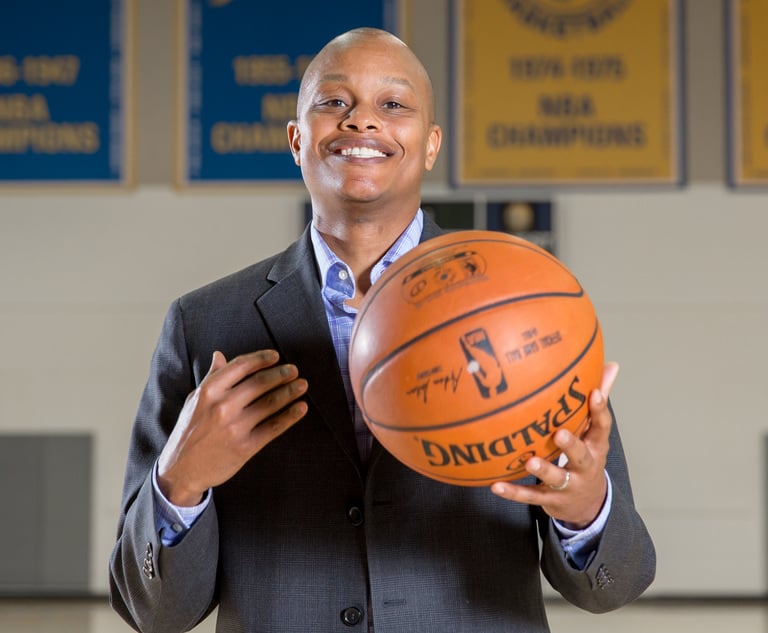Innovations in Technology and Policies Drive Citizens Financial Group GC
Gannon, a veteran in-house legal leader, touched on numerous issues in an interview with Corporate Counsel, including artificial intelligence, cybersecurity and law firm convergence.
April 27, 2018 at 05:56 PM
5 minute read
 (Photo: Helen89/Shutterstock.com)
(Photo: Helen89/Shutterstock.com) Lawyers are so bound by precedent that they can be caught in a trap of becoming backward-looking, according to Stephen Gannon, the veteran general counsel and chief legal officer of Providence, Rhode Island-based Citizens Financial Group Inc.
 Steve Gannon
Steve Gannon “Our clients are completely focused on innovation, and particularly on what technology can do to help customers,” noted Gannon. “So much so that someone said, 'We are becoming technology companies with banking licenses,' and I think that's true.”
Gannon spoke with Corporate Counsel recently about significant trends he is seeing in the banking industry, ranging from the use of technology to diversity to outside counsel management.
He spoke from experience—35 years of advising the financial services industry. Before joining Citizens, Gannon served seven years as deputy general counsel at Capital One Financial Corp. in McLean, Virginia, and six years as general counsel of the Retail Brokerage Group at Wachovia Securities in Richmond, Virginia.
Prior to that, he was in private practice for 20 years at several firms as a litigator and securities counsel in Richmond, including LeClairRyan; what was then McSweeney, Burtch, and Crump; and Hunton & Williams. He also spent two years with the U.S. Securities and Exchange Commission's Enforcement Division in Washington D.C., including one year as a branch chief.
His work at Citizens, though, has been some of the most challenging of his career. He led his legal team when the bank separated from a troubled Royal Bank of Scotland in 2014, and the same year oversaw the bank's initial public offering—the largest commercial bank IPO in history.
These days, Gannon said, he is “putting a lot of thought an effort into artificial intelligence. All internal legal departments must get smarter about using it.”
Gannon said Citizens now uses AI in risk management and human resources, “and we want to use it more in legal to better manage outside legal bills and to drive more stability and predictability with regulators.”
He also finds cybersecurity threats worrying. “It's no secret everybody is concerned about that,” he said, explaining that the legal team conducts tabletop exercises on what happens in case of a breach or if some part of the bank's network goes down.
“There will be a legal and regulatory impact, and we want to be ready when it happens,” he said.
For how long? “This will probably never end, and we will always be preparing,” he said. “We are baking it into our culture.”
Gannon said when he arrived at Citizens in 2014 that there were “a couple hundred law firms” on the bank's provider list. “We shrunk it to 70. Then, in another round, to 45. And there will be more shrinking, as AI data gets richer every year, to compare and assess law firms,” he explained.
But it's not just about the money. It's also about the quality of results and the length and depth of relationships. “At the end of the day,” Gannon said, “when you are thinking hard about a difficult problem that can really impact the bank, you want advice you can trust. Use the data but value the relationships.”
Gannon's sense is that GCs are in “a pretty good place” when it comes to hiring outside law firms. The legal industry has bounced back strongly from the recession, he said, and a series of recent mergers have created strong, robust firms that can deliver services across a wide variety of business and geographic areas.
“If there's one firm not able to deliver the value proposition we want, we are happy to move on to another,” he said. “There are a wide variety of firms that have set a high [performance] bar for themselves, and I have broader choices than ever. There is a smorgasbord out there for us.”
Gannon touched on other aspects of his work as well:
- Diversity. The legal department created an “innovation council” made up of nonmanagement employees so that ideas would “bubble up.” Gannon said he has accepted every recommendation on diversity and inclusion, including adding diversity to the scorecard used to evaluate outside law firms. He brings in diverse speakers from the legal world and is actively involved in the bank's business resource groups, which are networks for women, people of color, veterans and LGBT.
- Regulations. He said efforts are underway to simplify and streamline the complex regulations adopted under the Dodd-Frank Act. “Regulators have a new commitment to transparency and to giving us more predictability,” Gannon added.
- Corporate Governance. The GC said he oversaw significant changes in the corporate governance function in support of the bank's board of directors. The enhancements include more board involvement, with outreach to investors and listening to understand their concerns; more board training on important issues; and continual board evaluations. “In 2017, we had the best year ever, financially,” Gannon said. “And we think the board leadership and good governance did a lot to contribute to that.”
This content has been archived. It is available through our partners, LexisNexis® and Bloomberg Law.
To view this content, please continue to their sites.
Not a Lexis Subscriber?
Subscribe Now
Not a Bloomberg Law Subscriber?
Subscribe Now
NOT FOR REPRINT
© 2025 ALM Global, LLC, All Rights Reserved. Request academic re-use from www.copyright.com. All other uses, submit a request to [email protected]. For more information visit Asset & Logo Licensing.
You Might Like
View All
NBA Players Association Finds Its New GC in Warriors Front Office



Trending Stories
- 1Auto Dealers Ask Court to Pump the Brakes on Scout Motors’ Florida Sales
- 2German Court Orders X to Release Data Amid Election Interference Concerns
- 3Litigation Trends to Watch From Law.com Radar: Suits Strike at DEI Policies, 'Meme Coins' and Infractions in Cannabis Labeling
- 4Judge Gets Public Reprimand for Favoring Cops
- 5Investor Sues in New York to Block $175M Bitcoin Merger
Who Got The Work
J. Brugh Lower of Gibbons has entered an appearance for industrial equipment supplier Devco Corporation in a pending trademark infringement lawsuit. The suit, accusing the defendant of selling knock-off Graco products, was filed Dec. 18 in New Jersey District Court by Rivkin Radler on behalf of Graco Inc. and Graco Minnesota. The case, assigned to U.S. District Judge Zahid N. Quraishi, is 3:24-cv-11294, Graco Inc. et al v. Devco Corporation.
Who Got The Work
Rebecca Maller-Stein and Kent A. Yalowitz of Arnold & Porter Kaye Scholer have entered their appearances for Hanaco Venture Capital and its executives, Lior Prosor and David Frankel, in a pending securities lawsuit. The action, filed on Dec. 24 in New York Southern District Court by Zell, Aron & Co. on behalf of Goldeneye Advisors, accuses the defendants of negligently and fraudulently managing the plaintiff's $1 million investment. The case, assigned to U.S. District Judge Vernon S. Broderick, is 1:24-cv-09918, Goldeneye Advisors, LLC v. Hanaco Venture Capital, Ltd. et al.
Who Got The Work
Attorneys from A&O Shearman has stepped in as defense counsel for Toronto-Dominion Bank and other defendants in a pending securities class action. The suit, filed Dec. 11 in New York Southern District Court by Bleichmar Fonti & Auld, accuses the defendants of concealing the bank's 'pervasive' deficiencies in regards to its compliance with the Bank Secrecy Act and the quality of its anti-money laundering controls. The case, assigned to U.S. District Judge Arun Subramanian, is 1:24-cv-09445, Gonzalez v. The Toronto-Dominion Bank et al.
Who Got The Work
Crown Castle International, a Pennsylvania company providing shared communications infrastructure, has turned to Luke D. Wolf of Gordon Rees Scully Mansukhani to fend off a pending breach-of-contract lawsuit. The court action, filed Nov. 25 in Michigan Eastern District Court by Hooper Hathaway PC on behalf of The Town Residences LLC, accuses Crown Castle of failing to transfer approximately $30,000 in utility payments from T-Mobile in breach of a roof-top lease and assignment agreement. The case, assigned to U.S. District Judge Susan K. Declercq, is 2:24-cv-13131, The Town Residences LLC v. T-Mobile US, Inc. et al.
Who Got The Work
Wilfred P. Coronato and Daniel M. Schwartz of McCarter & English have stepped in as defense counsel to Electrolux Home Products Inc. in a pending product liability lawsuit. The court action, filed Nov. 26 in New York Eastern District Court by Poulos Lopiccolo PC and Nagel Rice LLP on behalf of David Stern, alleges that the defendant's refrigerators’ drawers and shelving repeatedly break and fall apart within months after purchase. The case, assigned to U.S. District Judge Joan M. Azrack, is 2:24-cv-08204, Stern v. Electrolux Home Products, Inc.
Featured Firms
Law Offices of Gary Martin Hays & Associates, P.C.
(470) 294-1674
Law Offices of Mark E. Salomone
(857) 444-6468
Smith & Hassler
(713) 739-1250






